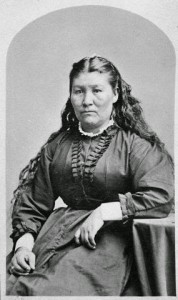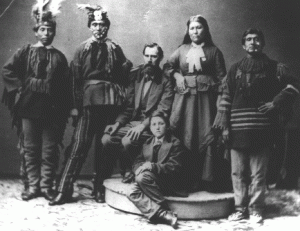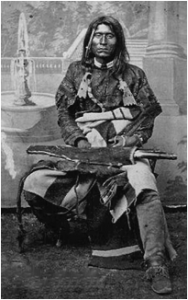 Once again my excellent friend, August McLaughlin, asked me to participate in her “Beauty of a Woman” Blogfest for 2015. This year I’ve chosen to write about a remarkable Native American woman named Winema, the “Modoc Woman of the Brave Heart.” She is the main “character” in my recently published historical novel, Stone Woman: Winema and the Modocs. Billed as A WAR STORY; A LOVE STORY; A TRUE STORY, the book focuses on Winema’s great love for a white man, Gold Rush miner Frank Riddle; their involvement in helping maintain the uneasy peace between the white settlers and the Modoc tribe of northern California/southern Oregon prior to the Modoc Indian War of 1872-1873; their role as interpreters during the hostilities; and the war’s aftermath. For this post, we’ll just focus on the love story. (Check out August’s “fest page” for chances to win spectacular prizes between February 23 and March 1.)
Once again my excellent friend, August McLaughlin, asked me to participate in her “Beauty of a Woman” Blogfest for 2015. This year I’ve chosen to write about a remarkable Native American woman named Winema, the “Modoc Woman of the Brave Heart.” She is the main “character” in my recently published historical novel, Stone Woman: Winema and the Modocs. Billed as A WAR STORY; A LOVE STORY; A TRUE STORY, the book focuses on Winema’s great love for a white man, Gold Rush miner Frank Riddle; their involvement in helping maintain the uneasy peace between the white settlers and the Modoc tribe of northern California/southern Oregon prior to the Modoc Indian War of 1872-1873; their role as interpreters during the hostilities; and the war’s aftermath. For this post, we’ll just focus on the love story. (Check out August’s “fest page” for chances to win spectacular prizes between February 23 and March 1.)
AN UNLIKELY PAIR
Winema goes to the town of Yreka, California for the first time in 1857. Some of her people have already been there and have fallen prey to the white man’s whiskey. Men have been known to “trade” their squaws and daughters for a bottle. When Winema’s father, much to her shock, attempts to do this, Frank Riddle intervenes. This is the first time they meet. Winema tags along with Frank, helps him at his mining claim, and tidies up his cabin.
have fallen prey to the white man’s whiskey. Men have been known to “trade” their squaws and daughters for a bottle. When Winema’s father, much to her shock, attempts to do this, Frank Riddle intervenes. This is the first time they meet. Winema tags along with Frank, helps him at his mining claim, and tidies up his cabin.
All along, Frank has been true to his “fair-haired girl” in Kentucky, Ellen Bingham. But seven years have passed since he left home, and he doesn’t believe Ellen will show up in California, nor does he have any intention of returning. Over the next few days he is taken in by Winema’s spell, but still he resists.
MATCHMAKER, MATCHMAKER…
Winema has been staying at the home of Amelia and William Jensen. The young Modoc, now realizing that she loves Frank, pours her heart out to Amelia, herself a Kickapoo Indian from the Midwest, while Frank does the same with William. Both of them learn the challenges created by a union between a white man and an Indian. Still, Winema is sure of her heart, so Amelia concocts a plan to invite Frank for dinner, with only Winema there. The scene, in part, goes like this:
The rear door was ajar. Frank knocked, and it swung open. Winema stood smiling on the other side of the room. She wore a fine dress of Amelia’s that Jensen had bought over a year ago in anticipation of his wife’s coming. Her soft hair was brushed straight and ornamented with red ribbons. The smooth skin of her face glowed in the light filtering through the room’s curtained windows. Frank thought her beautiful.
“Evening,” he said.
“Hello, Frank. Happy seeing you again.”
“So am I. Say, what smells so good?”
She indicated the iron stove. “Ah-melia teach me cook real fine. Ready soon.”
Frank watched her work. For one who had never seen the inside of a kitchen until a few days ago she seemed to know her way around. Dinner soon sat on the table, a delicious beef stew. “Either you’re fooling me about who made this,” he said, “or Amelia had one heck of a pupil!”
They ate quietly for a time. Their eyes met, Winema’s expressing happiness at being here with Frank, his deep-set pair—strong and reassuring—saying much the same. But then they became veiled by something, and she seemed to notice this.
“Something wrong?” she asked.
“Just thinking about the other night. I didn’t mean to scare you off. You must’ve thought me a real jackass.”
“Not know jackass. But it okay; not ’member anymore.”
He smiled. “Thank you.”

Winema, Modoc Woman of the Brave Heart
Along one wall of the large room was an overstuffed settee, next to it a small table that held one of Amelia’s last links with her old life: an oil lamp with a ruffle-edged shade of linen. Frank had lit it earlier against the coming darkness. Now, as they sat down, he turned it up. But not too much.
“You tell more ’bout ole Kentuck?” Winema asked. “Tell more ’bout great canoes with wheels that move and—”
“Hold on. You already heard me talking, so now it’s your turn. I don’t know much about you and your people, other than what Bill told me.”
It seemed hard at first, with her limited words, for Winema to talk about her life. But as the images unfolded she became an adept narrator. He listened intently, fascinated by the strangeness and seeming primitiveness of the Modoc culture, from which this scrubbed, well-dressed girl sitting next to him and speaking passable English had emerged. She did not hesitate to voice her opinions over things with which she disagreed, and he sensed her strong will. From what he heard he also believed she would not grow old in such a life, that one way or another her destiny lie elsewhere.
They sipped coffee, and talked more. Her hand slipped into his, and he held it gently. Another time he put his head on the shoulder she offered, and she rubbed his neck and temples with strong fingers. At first he stiffened at this infringement upon the domain of another; then he surrendered to the sensual delight of her touch, as he was already surrendering to her heart.
In a soft voice she sang to him: Kamisnostinto, the provocative Modoc love song. The guttural sound of the Lutuamian tongue belied the meaning of the words, which perhaps was for the better. But he sensed the implications.
At a few minutes before ten they heard noise in the adjoining livery. Castle had returned and now climbed to his small room in the loft. The spell was over, and they stood.
Winema sighed. “Ah-melia and William come soon too. Frank?”
“Yes?”
“I see you again. Tomorrow.” She did not ask.
“I’d like that.”
They walked to the door. He took her hands. Bending, he kissed her softly on her cheek, then, tentatively, on the lips. She looked at him for a moment, then entwined her fingers around his neck and kissed him firmly.
It was done, and they separated. She backed away as he opened the door. For a moment she probed her thoughts for the words. In a whisper she said, “I love you, Frank Riddle.”
His words wouldn’t come. He looked at her, heart pounding. When he would have spoken she put her fingers to his lips.
“Say nothing until you know it is time. Good night.”
DESTINY STEPS IN
Frank wrestles with his feelings before finally giving in to them. He rides into town and, with the Jensens present, professes his love for Winema and his desire to take her as his wife. She of course agrees. After he leaves, Winema has this brief exchange with Amelia:
Jensen had gone back to work, leaving Amelia to meet Winema. The Kickapoo woman hugged her charge, saying excitedly, “You did it, Winema. He’s yours. Frank is yours!”
“I happy too,” the girl replied, “but…puzzled.”
“About what, dear?”
“Too easy; thought it would take two nights.”
MELODRAMATIC…BUT SO WHAT?

Frank Riddle (c) with Winema, their son Jeff, and Modoc warriors, c. 1875.
Stone Woman is at least 90+ percent true, but we who turn historical fact into fiction are allowed our liberties. While the marriage ceremony in this final scene, performed in the Modoc way, is true, the opening is…well, creative. Before the ceremony gets underway, the Yreka postmaster shows up with a long-anticipated and dreaded letter for Frank:
Frank’s hand trembled as he took it. Winema turned away; the Jensens looked at each other uncomfortably. The children and the Indian guests were puzzled.
It had to be done. Frank tore open the envelope, unfolded the familiar stationery and read the words.

Captain Jack, Modoc chief and Winema’s cousin.
His solemn face exploded in a broad grin. “Yiii-aaa!” he yelled, sounding so much like a Paiute’s war cry that Captain Jack reached instinctively for a weapon. Winema was lifted off her feet and spun around, the rest embraced by the jubilant man, who shoved the letter into Jensen’s hand as he hurried to the door. “Don’t anyone leave,” he told them. “I got something to do and then I’ll be back.”
He left, and Jensen read the abbreviated message:
April 3, 1857
Dear Frank: Earlier this year I was wed to Second Lieutenant Bradford Morgan of Winchester.
Ellen
The prospectors along the creek weren’t quite sure what to make of their well-dressed neighbor who, after thundering up to his cabin, dropped to his knees and thrust his arm under the step to withdraw a sheaf of papers. They didn’t see him tear the picture from the small frame and add it to the packet, or weight the whole thing with a stone. But they watched as he ran to the creek and threw it into the deeper water near the middle, then mounted his horse and rode off as quickly as he had come.
In town Frank saw the postmaster on Miner Street. He handed him the empty silver frame. “Keep it,” he said, “for all the trouble. It’s worth something. Oh, and I won’t be seeing you much anymore.”
The ceremony was as brief as Winema had said. Their hearts were summoned together as one in the eyes of the Creator, whom they called by different names. Captain Jack formally accepted the presents as the intermediary of father and daughter. Winema’s cousins then said goodbye and rode off with the horses, while the rest stood and watched until they were gone.
Late Friday morning, August 14, 1857, Frank Riddle, Siskiyou County’s latest “squaw man,” and Winema Toby Riddle rode to their home, the cabin on Greenhorn Creek, to begin their lives together.

What a gorgeous scene! Thanks so much for participating.
Thank you, my dear. Always glad to be a part of this.
What a lovely story. Thanks for posting, Mike!
My pleasure, Kate. Winema was an amazing woman.
Sounds like an interesting story.
Thanks, Amaryllis. I came upon the true story of the Modocs many years ago while researching one of my horror novels. This is a case of truth being more compelling than fiction.
It’s a great scene, full of humor as well as foreshadowing of a life to come. Fun post and most appropriate for #BOAW15. Thank you.
Karen
Thanks so much, Karen. The Riddles DID have a good life together, but sadly, things did not go as well for Winema’s people. Same old story that affected just about all of our country’s indigenous population.
Fascinating scene, blending two cultures that are so different – yet bound by an attraction that could not be ignored…
Definitely a unique couple, Indy. Thanks.
A fascinating story. Enjoyed the photos, too!
Thanks, Jan. Those photos are treasures, to be sure.
What a wonderful love story! Epitomizes what makes a woman beautiful too– her strength and determination.
Winema was all that, and more. Thanks, Kourtney.
Thanks for sharing this, Mike! I love these old stories!
You’re welcome, Kassandra. I just wish the story would have ended better for the Modocs.
I love that you decided to highlight the history of the melting pot that makes this country beautiful….also, as a daughter of a multicultural marriage, myself, I really enjoyed watching the two worlds blend to make a whole new unique world of possibility.
Thanks so much, Kitt. We’re of like minds regarding multi-cultural marriages. I wish everyone could be so open-minded.
Agreed. 🙂